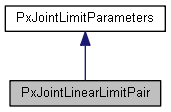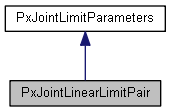 |
 |
Describes a two-sided limit. More...
#include <PxJointLimit.h>


Public Member Functions | |
| PxJointLinearLimitPair (const PxTolerancesScale &scale, PxReal lowerLimit=-PX_MAX_F32/3.0f, PxReal upperLimit=PX_MAX_F32/3.0f, PxReal contactDist=-1.0f) | |
| Construct a linear hard limit pair. The lower distance value must be less than the upper distance value. More... | |
| PxJointLinearLimitPair (PxReal lowerLimit, PxReal upperLimit, const PxSpring &spring) | |
| construct a linear soft limit pair More... | |
| PX_INLINE bool | isValid () const |
| Returns true if the limit is valid. More... | |
 Public Member Functions inherited from PxJointLimitParameters Public Member Functions inherited from PxJointLimitParameters | |
| PxJointLimitParameters () | |
| PxJointLimitParameters (const PxJointLimitParameters &p) | |
| PX_INLINE bool | isValid () const |
| Returns true if the current settings are valid. More... | |
| PX_INLINE bool | isSoft () const |
Public Attributes | |
| PxReal | upper |
| the range of the limit. The upper limit must be no lower than the lower limit, and if they are equal the limited degree of freedom will be treated as locked. More... | |
| PxReal | lower |
 Public Attributes inherited from PxJointLimitParameters Public Attributes inherited from PxJointLimitParameters | |
| PxReal | restitution |
| Controls the amount of bounce when the joint hits a limit. More... | |
| PxReal | bounceThreshold |
| PxReal | stiffness |
| if greater than zero, the limit is soft, i.e. a spring pulls the joint back to the limit More... | |
| PxReal | damping |
| if spring is greater than zero, this is the damping of the limit spring More... | |
| PxReal | contactDistance |
| the distance inside the limit value at which the limit will be considered to be active by the solver. As this value is made larger, the limit becomes active more quickly. It thus becomes less likely to violate the extents of the limit, but more expensive. More... | |
Additional Inherited Members | |
 Protected Member Functions inherited from PxJointLimitParameters Protected Member Functions inherited from PxJointLimitParameters | |
| ~PxJointLimitParameters () | |
Describes a two-sided limit.
|
inline |
Construct a linear hard limit pair. The lower distance value must be less than the upper distance value.
| [in] | scale | A PxTolerancesScale struct. Should be the same as used when creating the PxPhysics object. |
| [in] | lowerLimit | The lower distance of the limit |
| [in] | upperLimit | The upper distance of the limit |
| [in] | contactDist | The distance from the limit at which it becomes active. Default is the lesser of 0.01f scaled by the tolerance length scale, and 0.49 * (upperLimit - lowerLimit) |
References PxJointLimitParameters::contactDistance, PxTolerancesScale::length, and PxMin().
|
inline |
construct a linear soft limit pair
| [in] | lowerLimit | The lower distance of the limit |
| [in] | upperLimit | The upper distance of the limit |
| [in] | spring | The stiffness and damping parameters of the limit spring |
|
inline |
Returns true if the limit is valid.
References PxJointLimitParameters::isValid(), and PxIsFinite().
| PxReal PxJointLinearLimitPair::lower |
| PxReal PxJointLinearLimitPair::upper |
the range of the limit. The upper limit must be no lower than the lower limit, and if they are equal the limited degree of freedom will be treated as locked.
Range: See the joint on which the limit is used for details
Default: lower = -PX_MAX_F32/3, upper = PX_MAX_F32/3